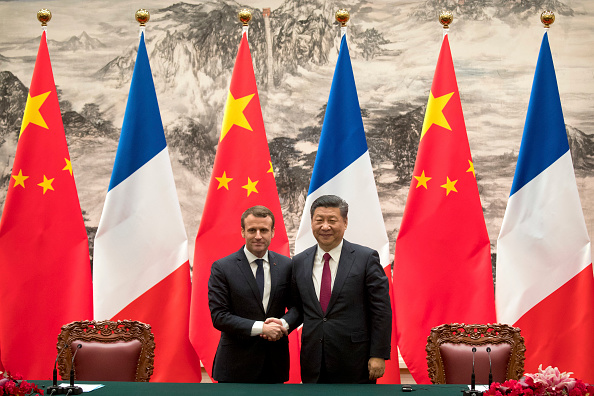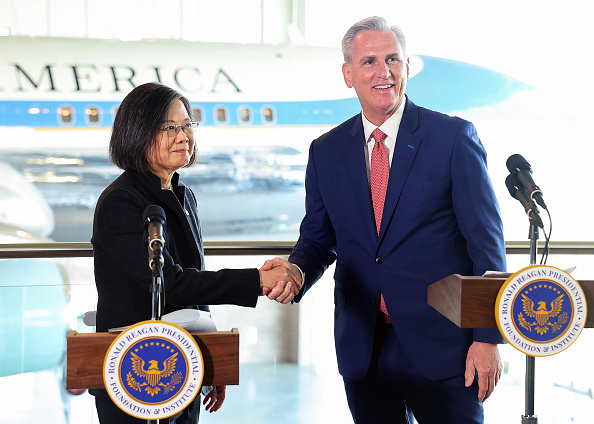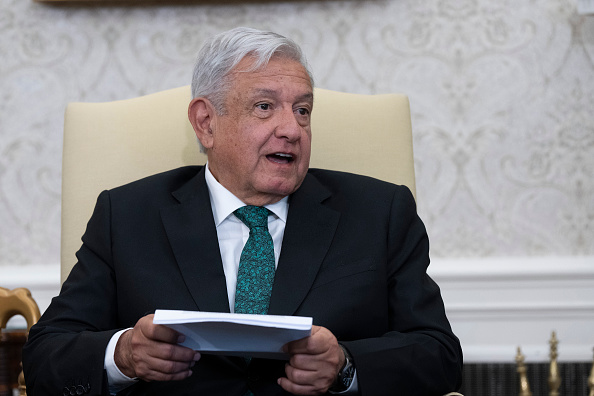
 Push and Pull
Push and PullFrench President Emmanuel Macron and the head of the European Commission Ursula von der Leyen are currently in Beijing for a three-day state visit intended to find ways to halt the Ukraine war, while also finessing the increasingly fraught trade relationship between the European Union and China, its biggest trading partner.
The two leaders are attempting to send a message of unity, even as many are watching for potential cracks in Europe's alliances. Macron invited von der Leyen to show that they come "not as disunited states, but as bearers of a European position," according to a senior French government official.
However, prior to the trip, von der Leyen gave a tough speech in Brussels, calling China's peace proposal for Ukraine "simply not a viable plan" and sounding concern that the country may be siding with Russia in the ongoing conflict.
Meanwhile, Macron thinks the visit should reestablish Europe as a "third way" somewhere between the U.S. and China and also said "we mustn't decouple with China," a departure from Washington's tougher rhetoric. During a meeting in Beijing, Macron endorsed the idea that Xi Jinping may be able to bring all sides together to discuss a way to end the Russian invasion.
"I know I can count on you to bring Russia back to reason and everybody to the negotiation table," Macron told Xi.
Their joint trip is the latest in a recent push from European leaders to engage with China, which has seen German Chancellor Olaf Scholz and Spanish PM Pedro Sánchez paying visits in recent months.
Read more in "War in Ukraine, One Year On," by Sebastian Contin Trillo-Figueroa, a European Union consultant and AsiaGlobal Fellow at the Asia Global Institute, HKU.
 Flying Through
Flying ThroughU.S. House Speaker Kevin McCarthy met Taiwanese leader Tsai Ing-wen in Los Angeles, marking the highest-profile meeting between an American official and the island's leader since Nancy Pelosi met Tsai in Taipei eight months ago. Beijing sent strong warnings against the meeting, pledging to take "strong and resolute measures."
Speaking in a joint appearance with McCarthy before a bipartisan group of U.S. lawmakers in Los Angeles, the Taiwanese leader thanked the U.S. for its support to Taiwan and vowed to "defend the peaceful status quo" in which the people of Taiwan can continue to thrive in a free and open society.
The "unwavering support," Tsai said, "reassures the people of Taiwan that we are not isolated, we are not alone."
To avoid provoking Beijing and triggering a military crisis, American and Taiwan officials have both portrayed Tsai's visit as a routine flythrough, citing numerous precedents for previous leaders from Taiwan transiting through the U.S.
Following the meeting, China sent warships into the waters around Taiwan and vowed to safeguard the sovereignty and territorial integrity of the island, which China defends as its own.
However, China's response was a far cry from the dramatic display of missile tests and military drills Beijing announced last year after former U.S. House Speaker Nancy Pelosi touched down in Taiwan.
Learn more in "Conflict is Not Inevitable," an interview with Michael Swaine, a senior research fellow in the East Asia program at the Quincy Institute for Responsible Statecraft.
 A Lingering Crisis
A Lingering CrisisOn Tuesday, Mexican President Andres Manuel Lopez Obrador announced that he requested assistance from Chinese President Xi Jinping in controlling fentanyl shipments from China, a synthetic opioid that has become a significant black-market narcotic in the United States.
Mexican drug cartels have increasingly become involved in the illegal trade of fentanyl, resulting in criticism of Mexico's efforts to combat the issue. In response, legislators in the U.S. are continuing to exert pressure on Mexico and are working to introduce legislation surrounding the drug.
But in his letter to President Xi Jinping, President Obrador appealed to China for humanitarian reasons, rather than as a result of criticism from the U.S.
The U.S. Drug Enforcement Agency reports that both finished fentanyl and precursor chemicals are transported from China to Mexico, the United States, and Canada, often by international mail. According to the U.S. government's statement in 2021, Chinese traffickers began to shift their focus from finished fentanyl to exporting precursor chemicals to Mexico after China implemented strict controls on fentanyl.
However, China's Foreign Ministry denied any illegal trafficking of fentanyl between China and Mexico, stating that Mexico had not informed them of any seizure of the drug from China. The Chinese Ministry also advised that the U.S. take more significant measures to regulate drug abuse within its borders and reduce demand, emphasizing that drug abuse is a problem "made in the U.S."
But despite previous actions China has taken to limit fentanyl exports, including historic cooperation in counternarcotics with the U.S., mislabeled or harder-to-detect precursor chemicals are continuing to appear globally.
Read more in "China: Elephant in the Room," by Chen Jimin, Guest Researcher at Center for Peace and Development Studies.
Prepared by China-US Focus editorial teams in Hong Kong and New York, this weekly newsletter offers you snap shots of latest trends and developments emerging from China every week, while adding a dose of historical perspective.
- 2023-03-31 Tsai in Transit
- 2023-03-24 A Changing World
- 2023-03-17 Peacemaker Xi
- 2023-03-10 Party Time
- 2023-03-03 “An Existential Struggle”
- 2023-02-24 Opposing Worldviews
- 2023-02-17 Ripple Effects
- 2023-02-10 Ballooning Tensions
- 2023-02-03 Hot Air
- 2023-01-27 Spheres of Influence
- 2023-01-20 China's Davos Pitch
- 2023-01-13 Strategic Encounters
- 2023-01-06 Common Challenges
- 2022-12-23
- 2022-12-16 All in On Africa
- 2022-12-09 Seeking Stabilization
- 2022-12-02 Turf Tension
- 2022-11-18 Thawing Ties?
- 2022-11-11 Face to Face
